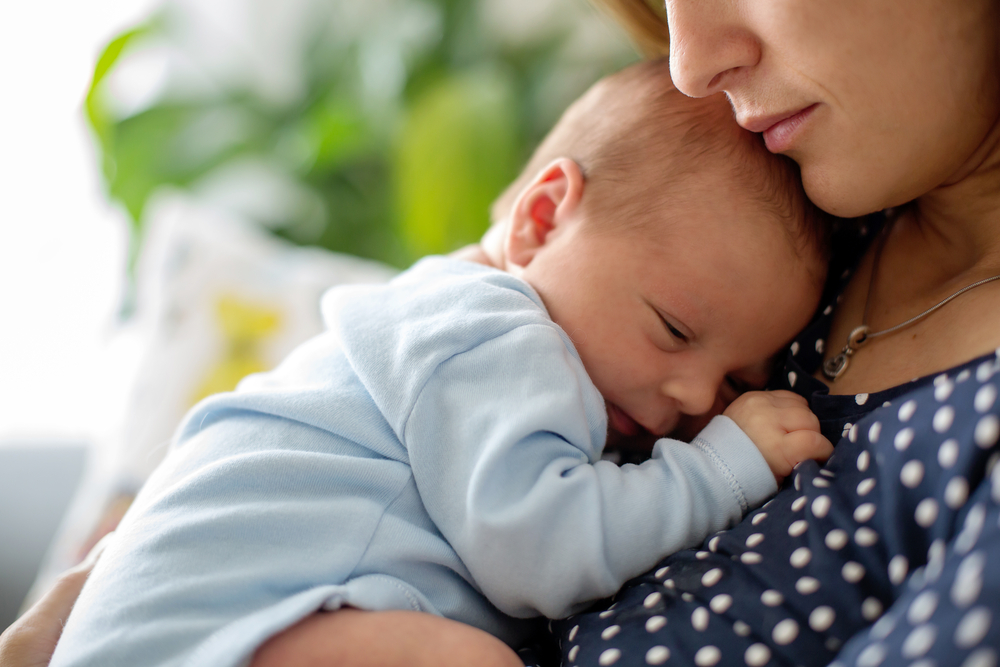Most women are familiar with “the baby blues” – a period of readjustment and turbulent emotions after childbirth. However, sometimes the baby blues can morph into a more serious condition known as postpartum depression. Today on the blog, we’ll discuss signs and symptoms of PPD, its diagnosis, and its treatment.
Postpartum Depression Explained
According to the Postpartum Stress Center, postpartum depression – abbreviated PPD – is an umbrella term which refers to a group of mood and anxiety disorders that can follow childbirth. It presents in a number of ways which depend on each individual’s predispositions and mental health. Typically, PPD is an agitated depression, meaning that this condition includes symptoms of both depression and anxiety.
We have previously discussed postpartum anxiety on this blog. These conditions are diagnosed when anxiety is the prevailing symptom, and may include postpartum panic, postpartum obsessive-compulsive disorder, and postpartum post-traumatic stress disorder. Postpartum depression, on the other hand, is a much more common condition following childbirth. Women experiencing this complication may cry frequently, experience mood swings, and deal with negative, intrusive thoughts.
Who is at Risk for PPD?
Being a new mom can be challenging even in the best circumstances – you’re dealing with sleepless nights, heightened emotions, and a major physical event. This will no doubt leave you feeling overwhelmed at times. This is normal; everyone who delivers a baby feels that way.
However, some factors put women at higher risk of developing postpartum depression. These include a past history of depression, family history of mental illness, experiencing a traumatic life event during pregnancy, substance abuse, difficult childbirth, mixed feelings about the pregnancy, and a lack of any support system. Women who fall into these categories should begin to arrange mental health care as early in their pregnancy as possible.
Signs of Postpartum Depression
Having a baby changes your life in countless ways. While this can be an exciting time, major life events like childbirth have the potential to disrupt your mental health. If you find yourself failing to adjust after the first few weeks of having a baby, it’s possible that postpartum depression has developed. The following symptoms can be helpful in deciding whether you should seek treatment:
- Feeling isolated or withdrawing from loved ones
- Being unable to take care of the baby or yourself
- Having trouble bonding with the baby
- Worrying that you’re not a good mother
- Experiencing severe anxiety, mood swings, and panic attacks
- A disrupted sleep schedule (sleeping all the time or not enough)
- Lacking interest in daily tasks, hobbies, and other activities
- Thoughts of suicide
- Thinking about harming the baby
Any level of PPD is cause for serious concern. If you are experiencing any of the above symptoms, we encourage you to seek professional help as soon as possible.
Treatment for PPD
PPD is a complex condition unique to women. Often, it can co-occur with a substance use disorder or other mental health concern. Fortunately, comprehensive, integrated treatment is available. Psychotherapy is considered the gold standard for the treatment of PPD. Qualified mental health professionals who specialize in this area can help you to recover. Support groups can also be helpful in reducing the feelings of isolation that tend to accompany this disorder.
There are also lifestyle changes that can aid in your recovery from PPD. First, be sure to take some time to yourself. This can help you to get a break from the stressors of mothering a newborn. You can take a walk around the neighborhood, watch your favorite show, or go for a meal at a local restaurant. Whatever you choose, taking a moment to breathe can be immensely helpful.
Additionally, be sure to ask for help when you need it. Don’t try to do everything yourself; you may be surprised by how willing your family and friends are to lend a hand. Whether it’s babysitting while you take a nap, doing a grocery run, or helping out around the house, your loved ones will be happy to assist you during this time.
Feel Like Yourself Again
At Pine Grove, we provide evidence-based care to women suffering from postpartum depression. Our Women’s Program is a gender-specific environment designed for optimum healing. Find advanced pharmacology, strong peer support, and inner peace at our center in Hattiesburg, Mississippi. We also provide outpatient mental health services in cities throughout the Southeast.
To learn more about our PPD treatment program, please contact our compassionate admissions staff today. They’re standing by to answer all of your questions, day or night. We look forward to speaking with you.

